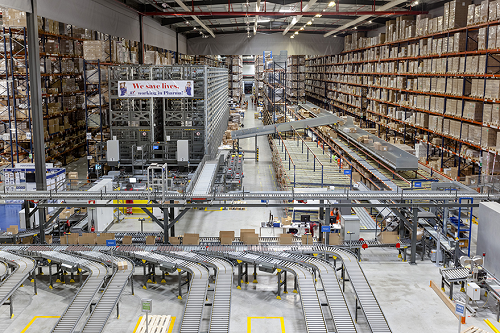ID Logistics is committed to deploying and investing in RD&I in Spain
The ID Logistics group was founded in France in 2006 and opened its Spanish subsidiary only five years later. Today it has over 360 logistics centres in 18 countries in Europe, America, Asia and Africa, and more than 30,000 employees. In Spain, the group's third largest in terms of turnover, it employs more than 4,000 people.
As a young company, sustainability is part of ID Logistics' DNA, with a continuous concern for reducing its carbon footprint and promoting sustainable practices in its operations. As well as innovating in supply chain management, it is investing heavily in implementing electric vehicles and robotic solutions.

What motivated ID Logistics to cross the Pyrenees?
The group's decision to expand into Spain in 2006 was based on the strategic vision of consolidating its presence in the European logistics market. With only five years’ experience at the time, it identified Spain as a significant opportunity to expand its geographical reach, take advantage of the potential growth of the logistics industry on the Iberian Peninsula and continue with its strategy and support for international customers. Spain undoubtedly played a crucial role in ID Logistics' global expansion. Our diversified geographic presence in 18 countries around the world has enabled us to offer comprehensive logistics services to customers in a variety of industries, positioning us as a key international player in the supply chain arena.
How important is Spain for the company's strategy?
Spain is a strategically important market for ID Logistics, the country with the third-highest turnover worldwide. We intend to consolidate and strengthen our position in this market by implementing continuous improvements in the services offered to our existing customers. We also remain open to strategic transactions that will drive our growth in the Iberian market, highlighting our long-term commitment to deploying and investing in research, development and innovation.
What infrastructure do you currently have in Spain?
We currently have a large infrastructure in the Iberian market, which includes 63 warehouses with a total surface area of over 1,150,000 square metres between Spain and Portugal. The company operates a fleet of 200 of its own trucks and more than 800 contracted trucks to provide services throughout the peninsula. When it comes to workforce numbers, ID Logistics Iberia has 4,300 employees of its own. The size of the facilities and fleet reflects the scale of ID Logistics' logistics operation in the region.
ID Logistics is much more than warehousing centres. How far do the services you offer go?
Indeed, at ID Logistics we are much more than just warehousing centres. We offer comprehensive logistics services covering transport, logistics management and customised solutions for customers in a wide range of industry sectors. This diversification demonstrates ID Logistics' ability to adapt to the specific needs of our customers, making us a comprehensive partner in supply chain management.
Now that logistics seems to be in a race to achieve sustainability, you are developing projects to reduce the environmental impact of transport. Which projects stand out in this respect?
Our commitment to sustainability is strong and, based on this, we are implementing specific projects to reduce our environmental impact. Initiatives include the incorporation of electric vehicles, in collaboration with Beiersdorf and Nestlé, the implementation of biofuels, such as HVO, and continuous improvement in managing greenhouse gas emissions through solutions like EcoTransiT. We also have specific medium-term plans, which include targets such as reducing our carbon footprint by 40% by 2030.
What have been your most important investments in Spain to date?
Although company policy does not allow us to provide specific details on investments in Spain, it should be noted that investment in robotic systems in this country over the past two years has amounted to approximately 12 million euros. These investments support the company's commitment to innovating and adopting advanced technologies in logistics operations.
In 2016, you acquired Logiters. What role have and will acquisitions play in the growth of ID Logistics in Spain?
The acquisition of Logiters played a key role in ID Logistics’ growth and consolidation in Spain. This strategic operation not only allowed the company to strengthen its presence in Portugal and in the Spanish logistics market, but also contributed significantly to its ability to offer comprehensive and diversified logistics solutions in the region. Looking ahead, acquisitions will continue to play a key role in ID Logistics' growth strategy, both in Spain and internationally. The group remains open to relevant business evaluations and transactions that will boost its leadership and enable it to support and accompany our customers every step of the way.
In 2022, the Ministry of Health awarded you the task of distributing vaccines in Spain. What other milestones stand out in the company’s trajectory?
In addition to being awarded that task in 2022, which was undoubtedly a key milestone for ID Logistics, the company has had other notable achievements, including innovative projects in supply chain management, investments in sustainability by incorporating electric vehicles, the development of robotic solutions, such as AMR, FMR and VSorters, large investment in digitisation and strategic partnerships with customers in various industries. These milestones reflect ID Logistics' ability to address complex logistics challenges and its commitment to innovation and service excellence.
Photos: ID Logistics



